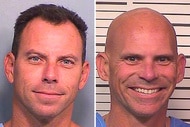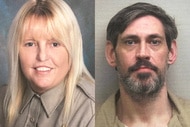Create a free profile to get unlimited access to exclusive videos, breaking news, sweepstakes, and more!
Cold Case Investigator Paul Holes Had 'Psychological Meltdown' After Years Of Gruesome Cases
True crime hero Paul Holes is opening up on the emotional toll that working on cases like the Golden State Killer had on him.

Paul Holes — a legend in the true crime community — has revealed that after years of working on and obsessing over some of America’s most disturbing cases, his mental health has suffered.
"It really wasn't until after I retired and I just had this psychological meltdown," he told National Public Radio this week. "I went in to see a therapist and I talked about my experiences during my career. And that therapist said, 'Paul, you got to understand, every time you buried that emotional trauma from these cases — which was many cases — those are little nicks that you get. And now you have so many nicks, you're bleeding out emotionally.'"
"I didn't recognize that over the course of my career," he added. "But I will tell you, it's very real and a lot of other people are experiencing that."
The report noted that Holes has suffered nightmares, endured marital issues and used bourbon to self-medicate — all the result of diving in deep on some very morbid cases.
The most famous case that Holes helped solve was the Golden State Killer case: His work helped lead to the arrest of ex-cop Joseph DeAngelo, who was convicted in 2020 of being the notorious California serial killer. Holes was working as cold-case investigator for the Contra Costa County District Attorney's office when true crime writer Michelle McNamara approached him about it, leading up to her 2013 Los Angeles Magazine piece on the case, The case was familiar to Holes as he'd initially began working on the case when he was in his 20s and a forensic toxicologist.
He then began working on the case again during his spare time, focusing on DNA and genetic genealogy; he's been widely credited for hunting down the man who killed at least 13 people and committed more than 50 rapes throughout California.
Holes has since worked numerous other cases, including the re-examination the mysterious death of Rebecca Zahau in Oxygen’s “Death At The Mansion: Rebecca Zahau,” which aired in the summer 2019. Just recently, he spoke out about Mitchell Bacom’s 2022 murder conviction in the death of 14-year-old Suzanne Bombardier, expressing concern that he might be a serial killer who preyed upon sex workers.
Holes told NPR that while many of the stories he worked on are “shocking at first,” he said he learned to “bury the weight of that emotional trauma.”
“That’s what I did,” he said. “I buried that shock and now I’m in the mode of ‘I got work to do.’”
Holes got into the trauma he experienced in his new memoir, “Unmasked,” which was released in April.
“So this is where the message with ‘Unmasked’ is not only talking about the pursuit of the Golden State Killer and these other cases I was involved with, it's really trying to convey that this profession has an impact on the individuals working it, their sacrifices these individuals have made of themselves, of their families,” he told NPR. “And that turns out really is why this book exists. It's now the fundamental message that I want to get out there.”
He added that he hopes that true crime lovers comprehend that the cases they learn about, and the people affected, are very real.
“A fundamental message that I am trying to continue to press, is that of course, we say it's entertainment, but within the true crime genre, we need to make sure that there is that ethical responsibility of understanding that this is real life,” Holes said. “And it's OK to watch these shows. It's OK to listen to the podcast, but continue to understand that people's lives have been affected.”






















